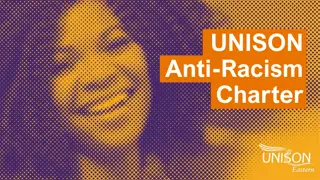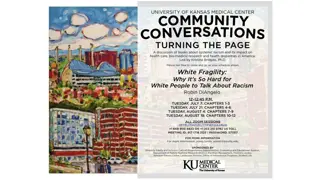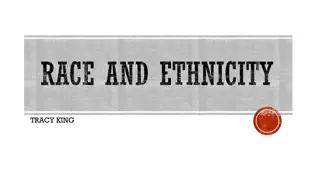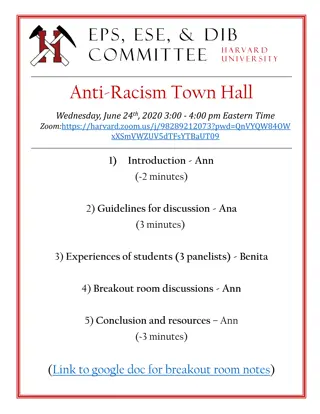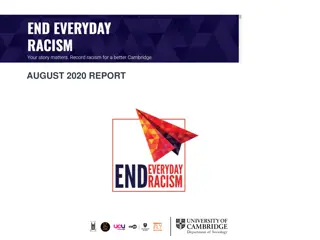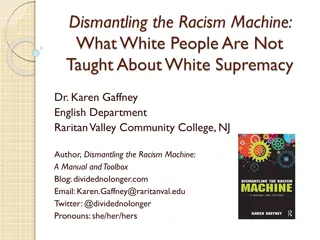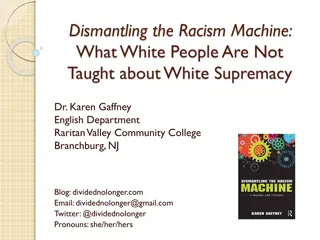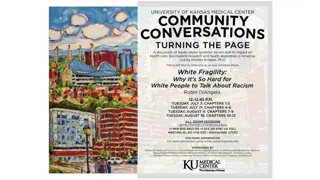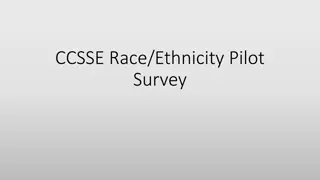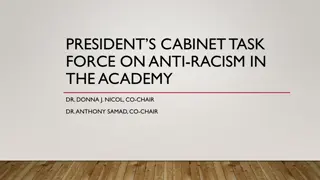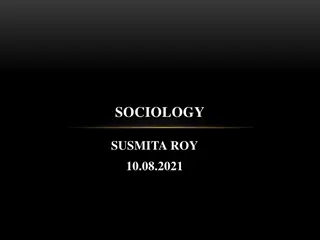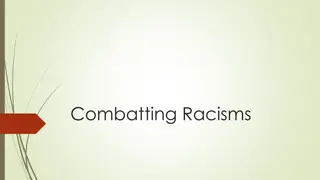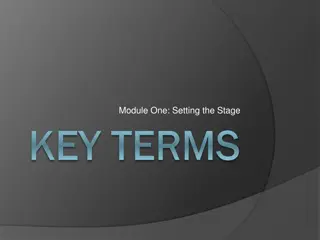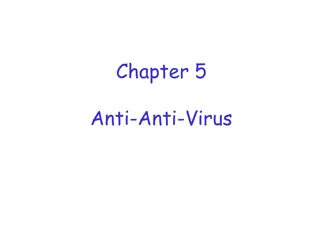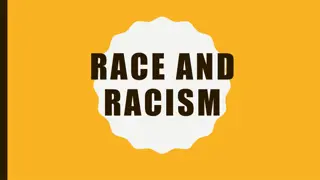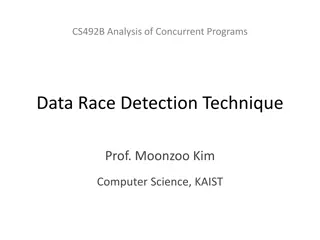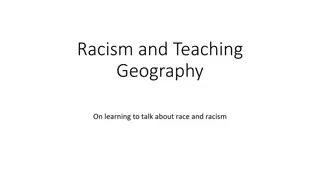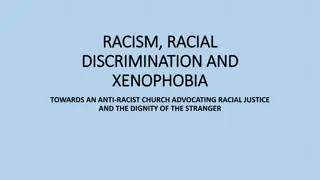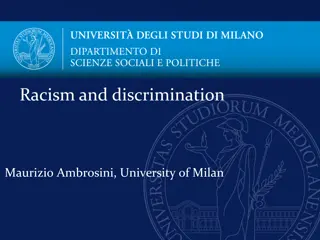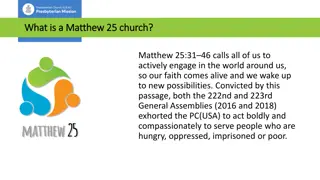Understanding Race, Diversity, and Anti-Racism in Society
Exploring the concepts of race, diversity, and anti-racism through defined terms, dimensions, determinants, and the importance of being anti-racist. Discussions led by Dr. Robert Solomon, Dr. Bryan Adamson, and Prof. David L. Solomon.
Download Presentation

Please find below an Image/Link to download the presentation.
The content on the website is provided AS IS for your information and personal use only. It may not be sold, licensed, or shared on other websites without obtaining consent from the author. Download presentation by click this link. If you encounter any issues during the download, it is possible that the publisher has removed the file from their server.
E N D
Presentation Transcript
LETS TALK ABOUT RACE Dr. Robert Solomon, Vice President, Office for Inclusion, Diversity and Equal Opportunity Dr. Bryan Adamson, Associate Dean of Diversity and Inclusion and David L. and Ann Brennan Professor of Law (he/him/his)
WHAT WE HOPE TO ACCOMPLISH Session Goals Process
DEFINING OUR TERMS Race: a socially constructed concept; an ethnological human stratification that was used to reinforce the rationale for the enslavement of persons of African descent Racism: prejudice, discrimination, or antagonism directed against a person or people on the basis of their membership of a particular racial or ethnic group, typically one that is a minority or marginalized and the power to exert said prejudice, discrimination, or antagonism Structural racism: the ways in which the joint operation of institutions produce racialized outcomes The trauma of racism: the cumulative adverse emotional, psychological, health, economic and social effects of racism on the lives of people of color
DEFINING OUR TERMS Culture: the shared experiences of acts, beliefs, values, language, attitudes, words, institutions, rules, rituals, images, spiritual practices, knowledge and relationships which are shaped and articulated within social systems Diversity: are individuals possessing immutable and mutable characteristics of diversity
Diversity Dimensions Immutable Mutable Cultural
OTHER DIVERSITY DETERMINANTS Politics Faith Skin Color Accomplishments Hobbies/Interests Technology Immigration Status Lifestyle Role in Family Generation Birth Order
ANTI-RACISM To be antiracist is to think nothing is behaviorally wrong or right -- inferior or superior -- with any of the racial groups. Whenever the antiracist sees individuals behaving positively or negatively, the antiracist sees exactly that: individuals behaving positively or negatively, not representatives of whole races. To be antiracist is to deracialize behavior, to remove the tattooed stereotype from every racialized body. Behavior is something humans do, not races do. Ibram X. Kendi, How to Be an Anti-Racist
HAVING THE CONVERSATIONSDETOURS AND DETOUR SPOTTING
1. Im Colorblind, People are just people; I don t see color. Reality Check and Consequence Statements like these assume that people of color are just like us, white, and have the same dreams, standards, problems, peeves that we do. Colorblindness negates the cultural values, norms, expectations and life experiences of people of color. Even if an individual white person could ignore a person s color, the society does not. By saying we don t see their color, we are also saying we don t see our whiteness. This denies their experience of racism and our experience of privilege. I m colorblind can also be a defense when afraid to discuss racism, especially if one assumes all conversation about race or color is racist. As my friend Rudy says, I don t mind that you notice that I m Black. Color consciousness does not equal racism.
2.The Rugged Individual and The Bootstrap Theory America is the land of opportunity, built by rugged individuals, where anyone with grit can succeed if they just pull up hard enough on their bootstraps. Reality Check and Consequence The rugged individual and the bootstrap theory are two of the crown jewels of U.S. social propaganda. They have allowed generation after generation to say, If you succeed, you did that, but if you fail, or if you re poor, that s your fault. Belief in this propaganda is founded in a total denial of the impact of either oppression or privilege on any person s chance for success.
3. Reverse Racism: (a) People of color are just as racist as white people. (b) Affirmative Action had a role years ago, but today it s just reverse racism; now it s discriminating against white men. (c) The civil rights movement, when it began was appropriate, valuable, needed. But it s gone to the extreme. The playing field is now level. Now the civil rights movement isno longer worker for equality but for revenge. Reality Check and Consequence (a) Let s first define racism: Racism= Racial Prejudice (white people and people of color have this) Plus (b)Systemic, Institutional Power (white people have this) To say People of Color can be racist, denies the power imbalance inherent in racism. Certainly, people of color can be and are prejudiced against white people. That was part of their societal conditioning. A person of color can act on their prejudices to insult, even hurt a white person. But there is a difference between being hurt and being oppressed. People of color, as a social group, do not have the societal, institutional power to oppress white people as a group. An individual person of color abusing a white person while clearly wrong, (no person should be insulted, hurt, etc.) is acting out of a personal racial prejudice, not racism.
Reverse Racism (Cont.) Reality Check & Consequence (Cont) (b) This form of denial is based in the false notion that the playing field is now level. When the people with privilege and historical access and advantage are expected to suddenly (in societal evolution time) share some of that power, it is often perceived as discrimination. (c)This was said by Rush Limbaugh, who is obviously no anti-racist, but this comment is loaded with white people s fears of people of color, especially if they gained control. Embedded here is also the assumption that to be pro-Black (or any color) is to be anti- white. A similar illogical accusation is directed at women who work for and end to violence against women and girls. Women who work to better the lives of women are regularly accused of being anti-male.
4. Blame the Victim (a) We have advertised everywhere, there just aren t any qualified people of color for this job. Or If he only had a stronger work ethic. Or (b) If she just felt better about herself... Or Internalized racism is the real problem here. Or (c) She uses racism as an excuse to divert us from her incompetence. And He goes looking for racism everywhere. As If racism is so hidden or hard to uncover that people of color would have to search for it.) Reality Check and Consequence All blame the victim behaviors have two things in common. First, they evade the real problem: racism. Second, they delete from the picture the agents of racism, white people and institutions, which either intentionally perpetuate or unintentionally collude with racism. As long as the focus remains on people of color we can minimize or dismiss their reactions, and never have to look directly at racism and our own responsibility or collusion.
5. Innocent By Association I m not racist, because ...I have Vietnamese friends, or my lover is Black, I donate to Casa Latina, or I marched with Dr. King. Reality Check and Consequence This detour into denial wrongly equates personal interactions with people of color, no matter how intimate they may be, with anti-racism. It ssumes our personal associations free us magically from our racist conditioning.
6. The white knight or white missionary We (white people) know just where to build your new community center. Or Your young people (read youth of color) would be better served by traveling to our suburban training center. Reality Check and Consequence It is a racist, paternalistic assumption that well meaning white people know what s best for people of color. Decisions, by white people, are made on behalf of people of color, as though they were incapable of making their own. This is another version of blame the victim and white is right. It places the problems at the feet of people of color, and the only appropriate solutions with white people. Once more the power of self-determination is taken from people of color. Regardless of motive, it is still about white control.
7. The White Wash He s really a very nice guy, he s just had some bad experiences with Koreans. Or That s just the way Uncle Adolf jokes. He s very polite to the Black janitor in his building. Reality Check and Consequence We re trapped here by another version of our guilt response. We attempt to excuse, defend or cover up racist actions of other white people. We are particularly prone to this if the other person is close to us, family or friend, and if we feel their actions reflect on us.
8. I Was An Indian in A Former Life. After that sweat lodge I really know what it feels like to be an Indian. I have found my true spiritual path. Reality Check and Consequence This is spiritual or cultural appropriation and poses a serious threat to the integrity and survival of Native cultures. To fill a void in their own spiritual core, some white people are drawn into the New Age garden to pick from a variety of Native spiritual packages usually offered for sale. Since Native spiritual practice is inseparable from their history and current community, it cannot be disconnected from that context to service white people searching for life s meaning. Appropriating selected parts of Native cultures romanticizes the lives of Native peoples while denying their struggles. Their lands and livelihoods stolen, indigenous peoples now witness white people trying to steal their spirituality. Rather than escape our white racism by finding a spiritual path, we instead collude in one more way with the genocidal attacks on Native cultures.
9. The Isolationist I thought we resolved this issue (racism) when it came up on the board last year. Or We need to deal with this specific incident. Don t complicate it by bringing up irrelevant incidences of the past. Or This only happened today because the TV news last night showed police beating a Black kid. Reality Check and Consequence Attempts are made to isolate a particular incident of racism from of the larger context. We blame a publicized incident of racism outside our organization to rationalize an internal incident and to avoid facing the reality of racism within. When trying to resolve an accusation of racism within an institution, we often see the incident in a vacuum, or as an aberration, in isolation from an historic pattern of racism. Racism has been so institutionalized that eve ry incident is another symptom of the pattern. If we continue to react incident to incident, crisis to crisis, as though they are unconnected, we will find genuine resolution only further from our reach.
10. Bending Over Blackwards Of course, I agree with you. Said to a person of color even when I disagree) or I have to side with Betty on this. (Betty being a woman of color.) Reality Check and Consequence Our white guilt shows up as we defer to people of color. We don t criticize, disagree, challenge or question them the way we would white people. And if we do disagree, we don t do it with the same conviction or passion that we would display with a white person. Our racism plays out as a different standard for people of color than for white people. If this is our pattern, we can never have a genuine relationship with a person of color. People of color when we are doing this. Our sincerity, commitment and courage will be rightly questioned. We cannot grow to a deeper level of trust and intimacy with people of color we treat in this way.
11. BWAME But What About Me. Look how I ve been hurt, oppressed, exploited...? Reality Check and Consequence This diminishes the experience of people of color by telling my own story of hardship. I lose an opportunity to learn more about the experience of racism from a person of color, while I minimize their experience by trying to make it comparable or less painful than mine.
12. Teach Me, Please I want to stop acting like a racist, so please tell me when I do something you think is racist. Reality Check and Consequence White people often assume we can learn about racism only from people of color. We further assume that people of color have the energy and/or desire to do this teaching. My understanding is that most people of color are weary of educating white people about racism. We will get stuck. We ll get frustrated and impatient with ourselves and other white people in this struggle. And we ll stay stuck if we don t seek help from other white anti-racists Our inclination has been to ask people of color to help us. We should seek out other white people BEFORE we go to people of color. Perhaps, as we become more trustworthy as allies, we will build genuine relationships with a few people of color who offer their reflections for us when we get stuck. This is at their discretion, not ours. We can t assume people of color should be so grateful for our attempts at anti-racism, that they will be willing to guide us whenever we are ready to be guided.
13. White On White, and Righteously So What is wrong with those white people? Can t they see how racist they re being? Or I just can t stand to be around white people who act so racist. And You re Preaching To The Choir You re wasting your time with us, we re not the people who need this training. Reality Check and Consequence We distance ourselves from other white people. We see only confirmed bigots, card carrying white supremacists and white people outside our circle as real racists. We put other white people down, trash their work or behavior, or otherwise dismiss them. We righteously consider ourselves white people who have evolved beyond our racist conditioning. This is another level of denial. There are no exceptional white people. (4) We may have attended many anti-racism workshops; we may not be shouting racist epithets or actively discriminating against people of color, but we still experience privilege based on our white skin color. We benefit from this system of oppression and advantage, no matter what our intentions are. This distancing serves only to divide us from potential allies and limit our own learning.
14. The Certificate of Innocence Sometimes we seek or expect from people of color some public or private recognition and appreciation for our anti-racism. Other times we look for a certificate of innocence to tell us we are one of the good white people. Reality Check and Consequence If our ally commitment depends on positive reinforcement from people of color, we set ourselves up for sure failure. The first time a person of color is displeased with our actions, we could respond, Well, if the people I m doing all this for don t want my help, then why bother? I quit. Clearly, we re challenging racism for them not for us. We have not identified our self-interest, as white people, for fighting racism. Until we do, we cannot stay on this lifelong journey.
15. Smoke And Mirrors We use the current PC language; we listen to the right music; we state the liberal line; we re seen at the right meetings with the right people. We even interrupt racist remarks when the right people are watching and when there is no risk to us. We look like an anti-racist. Reality Check and Consequence This is the Avon Ally, the cosmetic approach. People of color and other white anti-racists see through this pretense quickly. This pseudo-anti-racist posturing only serves to collude with racism and weakens the credibility of sincere white anti-racists.
16 . The Accountant We keep a tally sheet. If we perform some feat of anti-racism, we expect reciprocity from an individual or group of color, usually with some prestige or power that can serve our interests. Reality Check and Consequence I scratch your back, you scratch mine is NOT justice seeking nor ally behavior. It serves only to reduce justice work to some kind of power brokering currency.
17. Silence We stay silent. Reality Check and Consequence Our silence may be a product our guilt or fear of making people of color or white people angry with us or disappointed in us. We may be silent because our guilt stops us from disagreeing with people of color. We may be afraid that speaking out could result in losing some of our privilege. We may be silenced by fear of violence. The reasons for our silence are many, but each time we miss an opportunity to interrupt racism, or to act as allies or to interact genuinely with people of color or other white people. And no anti-racist action is taken as long as we are silent. [A note about silence: Silence is a complicated issue/matter. There are times when faced with a potential intervention situation that I may choose not to interrupt for reasons of good sense or strategy. Anti-racists need courage, but foolish risks makes little sense. When the choice is between intervening in this moment, alone, or gathering allies to speak out later in a more strategic way, the latter may prove more effective.]
18. Exhaustion And Despair Sound The Retreat I m exhausted. I m only one person. I can stop and rest for a while. Or Racism is so pervasive and entrenched, there just isn t any hope. Reality Check and Consequence Despair is a real enemy of anti-racists. For our commitment to be a lifelong one, we must find ways to mitigate the effects. Burn-out or desertion are of no use to the struggle. We can remember men who jumped on a Take Back the Night bandwagon, challenging violence against women for a while. Un til the attention on them as good men waned. Until the glamour of the issue faded. One of the historical, repeated failures of liberals in social justice movements has been short-term and inconsistent commitment to the issue du jour. If we quit, for any reason, we engage our default option. (5) As white people, we can take a break from the frustration and despair of anti-racism work. Such retreat will result in no significant consequences for us. racism doesn t allow such a respite for people of color. One of the elemental privileges of being white is our freedom to retreat from the issue of racism. If things get too tough we can always take a break. And our work against racism doesn t get done.
The Journey The Zones Self-Reflection Growth
RULES FOR DIALOGUE We will assume that each of us is coming from a place of good will and that we are working to achieve a common goal We will allow the expression of feelings, views, and experiences without judgment or fear of retaliation, on social media or otherwise We will give each other room to make mistakes when trying to articulate their feelings and concerns We will allow only one person to speak at a time We will describe behaviors, viewpoints, and incidents, not people
RULES FOR DIALOGUE We will be mindful of our nonverbal as well as verbal responses If we disagree with something that's been said, we will not direct a response at that other person or personalize the response, but rather express your own views, experiences, and perceptions Speak up if something is not working for you Listening
POOR LISTENING HABITS Call the subject matter uninteresting Criticize the delivery or appearance of the speaker Become too stimulated Listen only for facts Trying to outline everything that is being said Give false attention Tolerate or create distractions Evade the difficult topics Submit to emotional words Waste thought power
GOOD LISTENING HABITS Anticipate Do mental summary Weigh speaker s evidence Show That You're Listening Provide Feedback Defer Judgment Listen between the lines
QUESTIONS FOR BREAKOUT SESSIONS What was your reaction to the George Floyd killing? What was it about his killing that you most pained you? Why? What was it about him that you most related to? What does his killing say to you about racism? Can you describe the difference between interpersonal and institutional/structural racism? What role did institutional racism play in Floyd s killing? Do you see any connections of the institutional racism at work in Floyd s killing and your own institution or community? What are they? How are you coping with the emotional impacts of Floyd s killing and similar tragedies? Do you have any ideas on how we can help each other heal?
Endnotes: See Joan Olsson 1. Lillian Smith, Killers Of The Dream. W.W. Norton & Company: New York, 1949. Page 91. 2.Paraphrase of title by Andrea Smith. For All Those Who Were Indian In A Former Life. First printed in Sojourner: The Women s Forum, November 1990. 3. I first heard this phrase from Rev. Joe Barndt of Crossroads Ministry and the author of Dismantling Racism. Augsburg Fortress: Minneapolis. 1991. 4.Credit to Kathleen Carlin for her Principle of Intentions versus Effect from her Anti-sexism work. Translated here to a racism corollary. Before her death in 1996 she was the Executive Director of Men Stopping Violence in Atlanta, GA. 5. Term from Dr. Molesi Kete Asante, Chair of African American Studies, Temple University, Philadelphia, PA.


